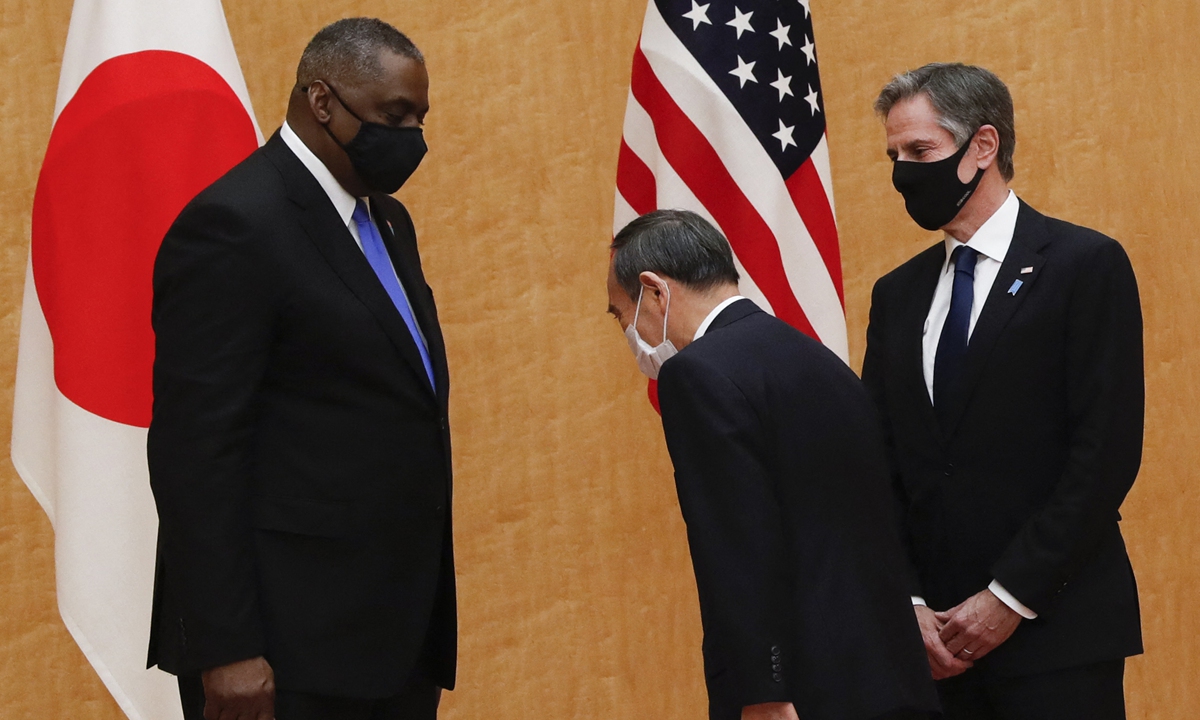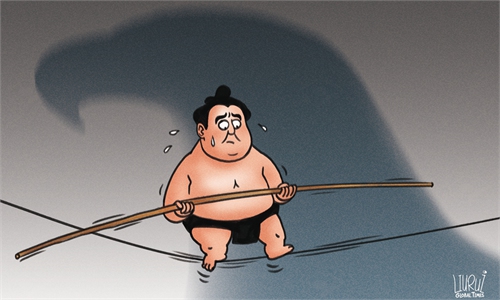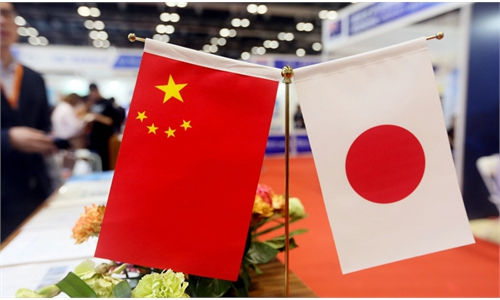
Japanese Prime Minister Yoshihide Suga greeted US Secretary of State Antony Blinken and US Defense Secretary Lloyd Austin. Photo: AFP
Chinese State Councilor and Foreign Minister Wang Yi on Monday held a phone conversation with Japanese Foreign Minister Toshimitsu Motegi. They reached consensus on a wide range of topics, such as promoting bilateral pragmatic cooperation, and supporting each other in hosting the Tokyo Olympic Games and the Beijing Winter Olympic Games.
But the two sides had spats as well. Motegi mentioned issues involving Diaoyu Islands, Xinjiang, and Hong Kong. Wang elaborated on China's position and opposed Japan's interference in China's internal affairs. Wang pointedly said that Japan should avoid being instigated, and thus "stretch its hands too far."
Japan recently carried out extensive moves to follow the US to pile pressure on China. This cast a shadow over the improvement of China-Japan relations. Japanese Prime Minister Yoshihide Suga is scheduled to visit the US in mid-April. Japan intends to display its tough stance against China to curry favor with the US prior to Suga's visit.
China-Japan ties saw a fresh round of fluctuations in the middle of 2020. At the initial stage of the COVID-19 pandemic, the two countries helped each other. When the pandemic in the US deteriorated, the Trump administration passed the buck to China, resorting to an extreme policy against China. In this context, Japan's China policy swung accordingly. And its relations with China have experienced a new round of waves.
Two factors have led to Japan being swayed by considerations of gain and loss. For one, Japan's foreign policy has been constrained by the US, which plays a leading role in Japan's diplomacy. Japan, which was fundamentally stricken by the US during World War II, has become the strongest, but most compliant ally compared to other US allies. When Washington asks it to take a side, Tokyo seems to be the one least able to resist. Japan's autonomy is remarkably less than South Korea in this regard.
For another, Japan has its own calculations. When seeing China-US relations gravely deteriorating, Japan regards it as an opportunity. By piling pressure on China, Japan hopes to force China to make concessions on issues such as Diaoyu Islands, cancel China's regular patrols near the waters since the Japanese government's "nationalization" of the islands in 2012.
Japan has taken its first step to interfere in China's internal affairs, but it is just a move at diplomatic statement level. It has not yet dared to initiate symbolic sanctions against China like the EU did.
This round of turmoil in China-Japan relations tells us that Japan is an unreliable country. It is poor in diplomatic autonomy and the influence of the US over it is absolute. Its diplomatic ethics is low as well. It is a country that has repeatedly hurt China in history, but has always been prejudiced against China while obedient to the US, which conquered it. Its diplomatic nature is not to uphold justice, but to yield to power. It is anticipated that China-Japan relations will not be any better and we should not hold any illusions on this.
At the same time, China's economic growth is gaining attraction with Japan. Japan, whose exports to China have surpassed those to the US, has developed a market dependence on China. This has already become a major constraint on how Japan gets along with China and the US. In addition, Japan, with its tense relations with all its neighbors, is reluctant to turn China into a strategic enemy. So there will be a limit to any further deterioration in China-Japanese relations.
Faced with this reality, China should handle its relations with Japan more magnanimously. China doesn't need to hesitate to criticize and expose problems of Japan. As a country that has a guilty conscience to China and Asia, Japan has a reckless mouth when criticizing China. Then, when necessary, China may as well unmask Japan's hypocrisy to the world and strengthen its image as a vassal of the US.
However, as long as Japan is doing so just at the diplomatic and public opinion levels, we should let these entanglements and resentment stay there as well. The two essential elements of China-Japan relations are security and economy. The security rope is mainly pulled by the US, while the economic bond is gradually tilting toward China. Chinese people need to believe that time will let the economic bond eventually overpower the rope of security.
The Diaoyu Islands dispute is not a fundamental conflict between China and Japan. It's a barometer and a touch stone for the comprehensive relationship between the two countries. If the Diaoyu Islands dispute intensifies, something must have gone wrong in other dimensions of the bilateral ties. Tokyo in recent days has been hyping the Diaoyu Islands dispute. What it really wants is to force China to make strategic concessions.
Tokyo thinks that facing US pressure, China will increase its efforts to draw Japan over to its side. However, those Japanese are wrong. China is committed to developing long-term friendly ties with Japan, but we are a country sticking to principles. No country can stand straight without principles. Let the opportunism be reserved for the Japanese.


